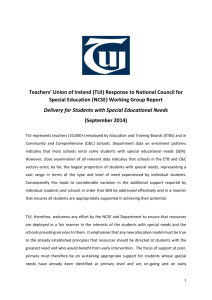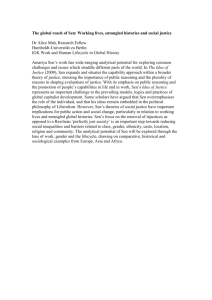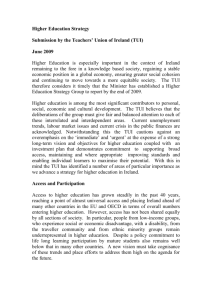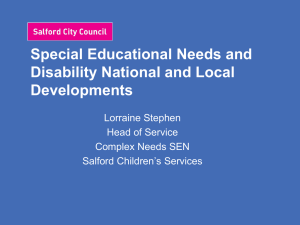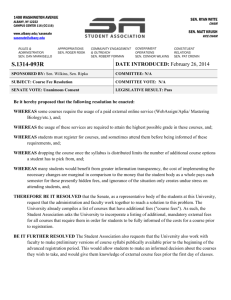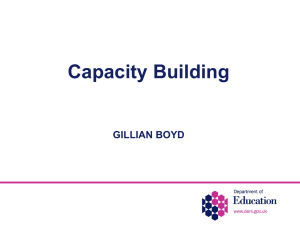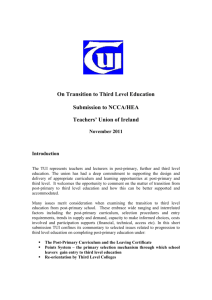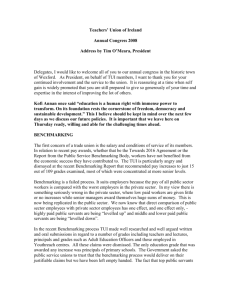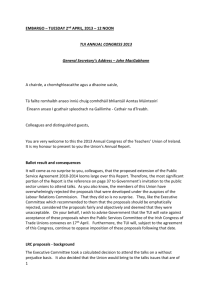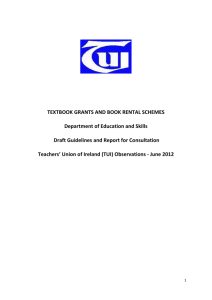The Role of Special Needs Assistants
advertisement
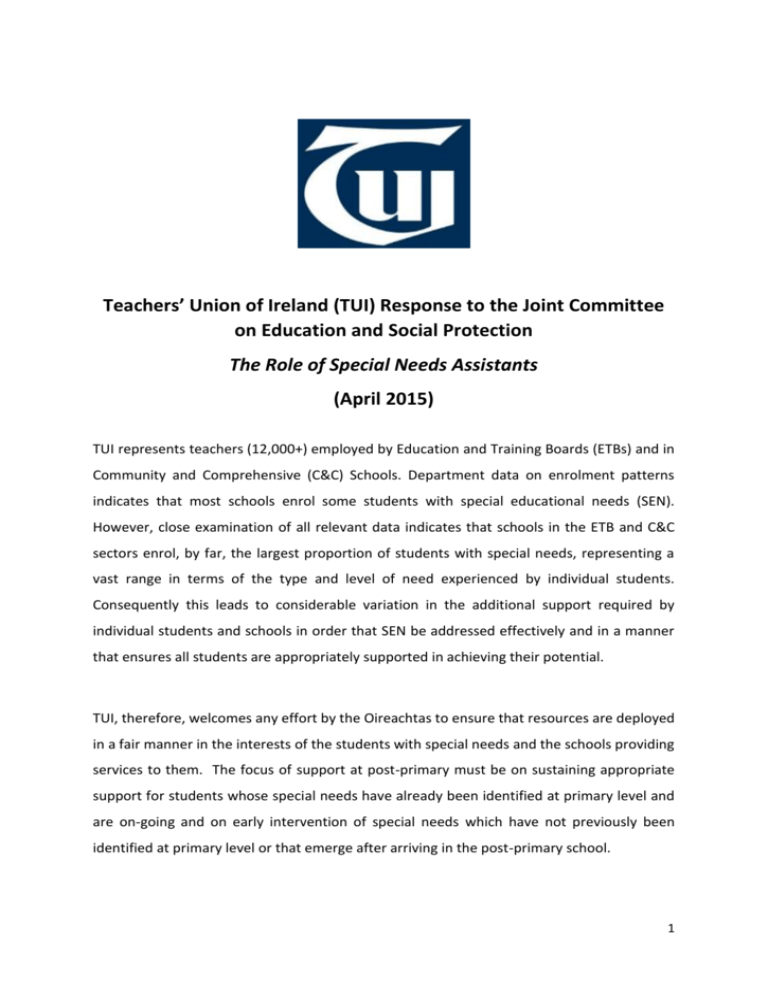
Teachers’ Union of Ireland (TUI) Response to the Joint Committee on Education and Social Protection The Role of Special Needs Assistants (April 2015) TUI represents teachers (12,000+) employed by Education and Training Boards (ETBs) and in Community and Comprehensive (C&C) Schools. Department data on enrolment patterns indicates that most schools enrol some students with special educational needs (SEN). However, close examination of all relevant data indicates that schools in the ETB and C&C sectors enrol, by far, the largest proportion of students with special needs, representing a vast range in terms of the type and level of need experienced by individual students. Consequently this leads to considerable variation in the additional support required by individual students and schools in order that SEN be addressed effectively and in a manner that ensures all students are appropriately supported in achieving their potential. TUI, therefore, welcomes any effort by the Oireachtas to ensure that resources are deployed in a fair manner in the interests of the students with special needs and the schools providing services to them. The focus of support at post-primary must be on sustaining appropriate support for students whose special needs have already been identified at primary level and are on-going and on early intervention of special needs which have not previously been identified at primary level or that emerge after arriving in the post-primary school. 1 Background Ireland has a very young population (Eurostat, 2015). In 2008, we had the second highest proportion of 10-14 year olds in the European Union (CSO, 2009). The high birth rate in Ireland (CSO, 2014) indicates that the population of young people is likely to remain high for the foreseeable future. DES (2014) suggests that the number of students in the primary school system will rise by 30,000 by 2019 and by 67,000 in second level by 2026. In this context, it is not sufficient to suggest that a world-class child/youth centred society can be achieved with inadequate resources of time, money or personnel. Preliminary data from the NCSE (2014a) show that over the 2013-2014 school year, 25,572 boys and 9,429 girls were allocated additional teaching resources for low incidence disabilities in mainstream primary and post-primary schools. Barnardos (2008) estimates that 18% of students fall within the parameters of the EPSEN Act. Growing Up in Scotland (2014) found that 11% of students were classed as having high levels of emotional and behavioural problems whilst 25% of students were classed as having low levels of satisfaction. Recent research by the University of Edinburgh, which was presented at a conference in Edinburgh on May 5 th, showed that social, emotional and behavioural difficulties are by far the most common SEN in mainstream schools and that students with SEN tend to be male and from disadvantaged communities. A commitment to implementing the EPSEN Act is essential if provision for students with SEN is to be adequately and appropriately addressed. However, full implementation will only be possible when sufficient resources are allocated to primary and post-primary schools. Almost ten years ago, TUI emphasised that schools were not sufficiently resourced to implement specific elements of the EPSEN Act, in particular designing and delivering Individual Education Plans (IEPs) for SEN students. In 2014, schools are in receipt of far fewer resources as a consequence of austerity measures since 2008. Most pertinently, the moratorium on posts of responsibility has diminished capacity to establish special needs departments or otherwise plan and co-ordinate related activity in most schools. In addition, a worrying level of casualisation has emerged and the expertise of many teachers with particular qualifications and training in special education is 2 lost as schools cannot deploy staff to best effect. Furthermore, the Department of Public Expenditure and Reform has removed the allowance payable to teachers who hold a Postgraduate Diploma in Special Educational Needs and participate in the planning and delivery of teaching supports to student with SEN. It’s difficult to see how the Government values the work of teachers who have pursued a qualification in SEN when the Government has removed the allowance for that qualification. Likewise, in the current context of much reduced staffing (fewer teachers and middle management posts, removal of ex-quota guidance posts, removal of enhanced allocations for areas such as Travellers and ESOL) many schools will not be in a position to assign adequate staff time to carry out a comprehensive profiling exercise of the student population and, in particular, of the totality of special needs that exist within it. In the interest of students TUI supports the full implementation of the EPSEN Act and embraces the core concepts of integration, inclusion, early intervention, individualised planning and monitoring of progress. However, this is somewhat impractical and overly ambitious as current government cost cutting policies in the public service are completely at odds with intention to implement. Efforts towards full implementation are laudable but TUI is emphatic that any additional work required cannot be imposed on teachers who are already overstretched on a daily basis and have suffered multiple pay cuts. Furthermore, full implementation would place considerable additional demands on other public services, in particular, the HSE. A measured and considered approach to managing the deployment of national resources is therefore critical and realistic expectations of what is achievable at school and service level are essential. Role of Special Needs Assistants It is against this difficult background that we address the difficulties encountered by students with SEN and the caring support given to them by approximately ten thousand special needs assistants, of whom over two thousand work in post-primary (source: www.ncse.ie). Special needs assistants play an important role in caring for students with significant care needs. Significant care needs may include eating, toileting and fragile health (NCSE, 2014b). 3 As noted by Griffin and Shevlin (2007: 250), “official DES policy as outlined in Circular 07/02 states that ‘special needs assistants are recruited specifically to assist in the care of pupils with disabilities in an educational context.’ The assistants’ duties are ‘of a non-teaching nature’”. This role has been reaffirmed by Circular 30/14 which “clarifies and restates the purpose of the SNA scheme, which is to provide schools with additional adult support staff who can assist children with special educational needs who also have additional and significant care needs. Such support is provided in order to facilitate their attendance at school and to minimise disruption to class or teaching time for the pupils concerned, or for their peers, and with a view to developing their independent living skills.” The Circular also “clarifies the role of the Classroom Teacher and Resource/Learning Support Teachers to provide for the education of a child, and the role of an SNA to support those teachers in assisting with care needs”. A range of courses are available to train SNAs for their caring role. Most of the courses are one year Level 5 awards. TUI supports the concept of inclusive education and believes that supports must be available to students who have significant care needs if they are to be integrated successfully in ‘mainstream schools’. There is a role to be played here by SNAs. There is also a vitally important role to be played by qualified and experienced educators such as special needs teachers who are qualified to Level 8/9 standard. The caring role is required but TUI believes that inadequate resources are provided to qualified educators to enable them to educate for life children with SEN. Such resources include greater provision of guidance counselling, a reduction in the pupil teacher ratio, provision of time to teachers to support parents of special needs children. Furthermore, whilst the DES currently pays the cost of the qualification required for special needs teaching, there is limited incentive for teachers to partake in this rigorous training programme if they cannot receive an allowance additional to basic salary on completion of the programme. The possibility of implementing EPSEN in full is predicated on the provision of adequate investment in special needs education including the adequate rewarding of extensive additional training undertaken by highly qualified teachers. 4 Ends David Duffy (Education/Research Officer, TUI), dduffy@tui.ie Colm Kelly (Assistant General Secretary, TUI), ckelly@tui.ie 5 Glossary ESOL English as a Second or Other Language EPSEN Education for Persons with Special Educational Needs Act 2004 DES Department of Education and Skills SNA Special Needs Assistant SEN Special Educational Need References Barnardos (2008), Tomorrow’s Child, Dublin: Barnardos CSO (2009), Children and Young People in Ireland 2008, Cork: Central Statistics Office CSO (2014), Vital Statistics Yearly Summary 2013, Cork: Central Statistics Office DES (2014), Organisation and Current Issues: A brief for the information of the Minister for Education and Skills, Dublin: Department of Education and Skills DES Circular 30/14, The Special Needs Assistant (SNA) scheme to support teachers in meeting the care needs of some children with special educational needs, arising from a disability DES Circular 07/02, Applications for full-time or part-time Special Needs Assistant support to address the special care needs of children with disabilities Eurostat (2014), Being Young in Europe Today, Luxembourg: Publications Office of the European Union NCSE (2014a), Delivery for Students with Special Educational Needs, Trim: National Council for Special Education NCSE (2014b), Information for Parents/Guardians of Children and Young People with Special Educational Needs, Trim: National Council for Special Education 6
